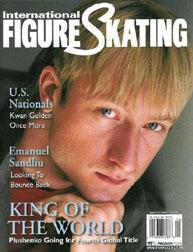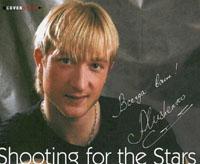By Susan Wessling
 A superstar in Europe, Evgeni Plushenko has been quietly making a name for himself in the United States where he tours with Champions on Ice. "The longer he has been around the larger his following has been " said Michael Collins, who runs the tour. "He always does good numbers and that is the key. And over the years he has had some very entertaining numbers, from the muscle man routine to very serious numbers as well. His range has brought them in and his following has grown, and I think it will even more so, by leaps and bounds after the next Olympics in 2006".
A superstar in Europe, Evgeni Plushenko has been quietly making a name for himself in the United States where he tours with Champions on Ice. "The longer he has been around the larger his following has been " said Michael Collins, who runs the tour. "He always does good numbers and that is the key. And over the years he has had some very entertaining numbers, from the muscle man routine to very serious numbers as well. His range has brought them in and his following has grown, and I think it will even more so, by leaps and bounds after the next Olympics in 2006".
The 22-year-old Russian is shooting for his fourth World Championship title in March and a little bit of history. If Plushenko should capture No. 4, he will be in the company of Americans Hayes Allen Jenkins and Scott Hamilton as well as Canadian Kurt Browning as only men in over 55 years to achieve that feat. Only Dick Button, with five titles, has more World men's titles in the era that goes back to 1947 (the championships were not held from 1940 to 1946 due to World War II).
For Plushenko, key to his success is a simple one. "I like to work and I like to be first," he said during a recent telephone interview with IFS from St. Petersburg. "I am like Tonto, all the time with a gun but instead of a gun [I shoot them down] with my skates."
Plushenko's list of accomplishment is quite impressive - along with his three World titles, he has already won four European championships, six Russian national titles, and an Olympic silver medal. He also added a fourth I.S.U. Grand Prix Final gold medal to his stash in December. Despite only being entered in one Grand Prix Series event (he pulled out of two others due to injury), Plushenko earned a spot to the final as an alternate and a withdrawal gave him a slot in the event. Plushenko clearly made the most of his chance. He skated like a well-oiled machine, reeling off a number of impressive jump combinations in his free skate - a quadruple toe loop -triple toe loop - double loop combination, a triple Axel - double toe loop combination, and a triple Lutz - triple toe loop combination as well as a number of other triples. He outdistanced the competition by 35 points to win the title.
The Russian skater said he was surprised to win the Grand Prix Final. "But in the final, I skated very good, and of course I was ready because I have been to the final four times. The finals are kind of like the World Championships with the six top skates," he said. "The best skaters skated in this competition, and of course, I was happy [to win]."
Plushenko credits his coach, Alexei Mishin, with helping him achieve the consistency to stay on top of the sport. Plushenko and Mishin have worked together for the past 10 years. "Together we are a good team", Plushenko said. "For example, when I am tired, or if I need a day off, or if I need a massage, or a sauna or (time in the) swimming pool, he knows me well enough to allow me to do those things." Mishin is more than just a coach to Plushenko. "To me he is more like a second father," the six-time Russian champion said. "He is a very good friend if mine, which I think is really important for skaters".
 His parents - particularly his mother - have also had a big impact on his career. As a teenager, Plushenko won his first World Championships and went into the Winter Olympic Games as a favorite for the gold medal. In the short program, he fell while attempting a quad, which he admits was lowest point of his skating career. "Of course (that was the worst moment)," he said. "That being an Olympic year and that was a dream, to be first in the Olympic Games. But I was 18 years old, so maybe if I won the Olympic Games maybe I will stop skating because at that moment I would have all the titles. So right now I have the titles but not the Olympic Games and I will try my best (to get that one)."
His parents - particularly his mother - have also had a big impact on his career. As a teenager, Plushenko won his first World Championships and went into the Winter Olympic Games as a favorite for the gold medal. In the short program, he fell while attempting a quad, which he admits was lowest point of his skating career. "Of course (that was the worst moment)," he said. "That being an Olympic year and that was a dream, to be first in the Olympic Games. But I was 18 years old, so maybe if I won the Olympic Games maybe I will stop skating because at that moment I would have all the titles. So right now I have the titles but not the Olympic Games and I will try my best (to get that one)."
After that fateful short program, Plushenko found himself in fourth place. It was his mother, Tatiana Vasilievna, who inspired him to skate well in the long program, a performance that carried him to the silver medal. "After I skated [the short program] I talked to my mom and she said, not to worry, that I could do it [skate well]," he said. "She told me to just do my best. She said, 'You will skate normal [in the free skate] and you will skate clean'. She gave me more strength."
Would Plushenko have been able to come back and win under the new scoring system? That is something he prefers not to dwell on. "I don't like to talk about this," he said.
The three-time World champion said he has some issues with the new system, "Right now I am not fine with this new system," he said. "A lot of people are forgetting about the quad. A lot of people they will skate clean and not be hurt [by the lack of a quad]. For example in some competitions, I see some skaters who hit quadruple toe and then another guy does not attempt them and he wins. I do not think that is good."
Going into this year's World Championships, Plushenko sees a number of skaters that could threaten his quest for a fourth title. "Everybody right now is a threat, "he said. "There is Timothy Goebel, Chengjiang Li, Emanuel Sandhu and Jeffry Buttle, and of course, Brian Joubert. There are many skaters. But of course I work hard, hard, hard."
His goal for the championships? "I would like to skate clean and then we will see because if I skate clean if I will make all my jumps in my program, make all my spins and steps, I can win for sure," he said. Collins said Plushenko's technical elements and his artistic range are impressive. "There is a new style of skating for this generations of skaters, very physical, very demanding jump-wise but then he does have that classic side. He is very classical on his artist side and at the same time he is very dynamic and physical with his jumps," Collins said. "I think he has the best of both. He is very fun to watch."
Plushenko's experience should also play a key role at the World Championships, according to Collins. "He is the guy that has been around and done everything more than one time, so he has the experience and knowledge. Right now that is really what sets him apart," Collins said. "He has all the talent and all the gifts, as some of the other skaters do, but when you get into pressure situations, the more you have been in that situation, the better you are prepared to deal with it. I think that gives him a nice edge."
While a number of European skaters have traveled to train in the United States, Plushenko has chosen to stay in his homeland to train. "I like to be here with my parents and my friends," he said. "There is everything I need in St. Petersburg. Russia. We have good-condition ice, very good quality and it is not cold right now on the ice, and I feel comfortable in Russia, to be at home. I travel a lot, especially in the past five years. I tour and there are a lot of competitions. So when I am done with exhibitions and competitions, I like to stay at home."
Being in Russia this summer will give Plushenko the chance to take a new career path. "I have some offers to be in movies," he said. "But I have competitions right now, and have to put the competitions first. Maybe in the summer I will make a movie."
That kind of focus is what has enabled Plushenko to experience so much success during his career. "After the competition I have days off and I get good rest," he said. "I love my work, I love my job. I love my life and I love to skate."
Plushenko said he may even stay in the amateur ranks until the 2010 Olympic Winter Games. "We will see," he said. "If I stay healthy, I would like to stay for sure until 2010. I like to compete. It is my life. I like to compete and I like to win."
тнрнюкэанл : пегскэрюрш : яяшкйх
рбнпвеярбн онйкнммхйнб
тнпсл : цняребюъ
